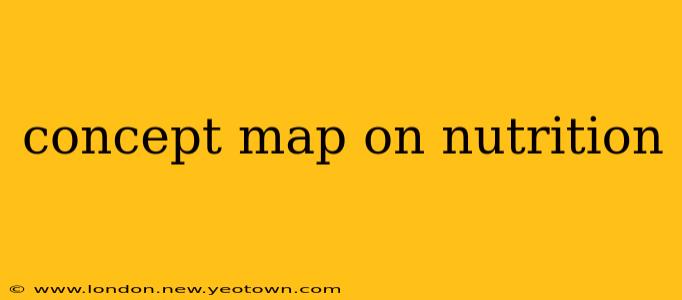Decoding the Deliciousness: A Concept Map on Nutrition
Our journey into the fascinating world of nutrition begins not with a dry definition, but with a story. Imagine a bustling marketplace overflowing with vibrant fruits, earthy vegetables, lean proteins, and wholesome grains. Each item holds a key to unlocking optimal health and well-being. This concept map will help you navigate this vibrant marketplace and understand the interconnectedness of food and your body.
Central Concept: Nutrition – The Science of Food and its Impact on Health
From this central concept, several key branches emerge, each representing a crucial aspect of nutritional understanding:
1. Macronutrients: The Body's Building Blocks
-
Carbohydrates: Think of carbs as the body's primary energy source. They fuel your brain, muscles, and all your daily activities. We break them down into simple sugars (like glucose) and complex carbohydrates (like whole grains and fiber).
- Simple Carbohydrates: Quick energy bursts, but often lead to energy crashes. Examples include sugary drinks and refined sugars.
- Complex Carbohydrates: Sustained energy release, rich in fiber. Examples include whole grains, fruits, and vegetables.
-
Proteins: The building blocks of tissues, enzymes, and hormones. Proteins are essential for growth, repair, and maintaining a healthy immune system.
- Complete Proteins: Contain all nine essential amino acids (meat, poultry, fish, eggs, dairy).
- Incomplete Proteins: Lack one or more essential amino acids (legumes, nuts, seeds). Combining these can provide all essential amino acids.
-
Fats: Often misunderstood, healthy fats are crucial for hormone production, cell function, and nutrient absorption.
- Unsaturated Fats: The "good" fats, found in avocados, nuts, seeds, and olive oil.
- Saturated Fats: Found in animal products and some plant-based foods; should be consumed in moderation.
- Trans Fats: Artificial fats, generally considered unhealthy and should be avoided.
2. Micronutrients: The Unsung Heroes
These essential vitamins and minerals work in concert with macronutrients to support countless bodily functions. A deficiency can have significant consequences.
- Vitamins: Organic compounds vital for various metabolic processes. Examples include Vitamin A (vision), Vitamin C (immune system), and Vitamin D (bone health).
- Minerals: Inorganic elements necessary for various functions. Examples include Calcium (bones), Iron (red blood cells), and Potassium (nerve function).
3. Dietary Guidelines and Recommendations
Navigating the nutrition world can be overwhelming. Dietary guidelines and recommendations provide a framework for healthy eating habits:
- MyPlate: A visual guide emphasizing the proportion of different food groups in a balanced diet (fruits, vegetables, grains, protein, dairy).
- Dietary Reference Intakes (DRIs): A set of recommended nutrient intakes to maintain health and prevent deficiencies.
- Portion Control: Understanding appropriate serving sizes to manage calorie intake.
4. Nutritional Deficiencies and Excesses
Understanding the potential consequences of both nutritional deficiencies and excesses is crucial:
- Deficiency Diseases: Illnesses resulting from insufficient nutrient intake (e.g., scurvy from Vitamin C deficiency, anemia from Iron deficiency).
- Obesity and Chronic Diseases: A consequence of excessive calorie intake and an unhealthy diet, often linked to heart disease, type 2 diabetes, and certain cancers.
5. Factors Influencing Nutritional Choices
Our food choices are influenced by a complex interplay of factors:
- Culture and Tradition: Food preferences often rooted in cultural background and family traditions.
- Socioeconomic Status: Access to nutritious foods can be significantly affected by economic circumstances.
- Personal Preferences and Taste: Individual choices also influence our diet.
- Environmental Factors: Sustainable food production and environmental impact of food choices.
This concept map provides a framework for understanding nutrition. Further exploration of each branch will unveil a wealth of information, empowering you to make informed choices for a healthier, happier life. Remember, nutrition is a journey, not a destination!

